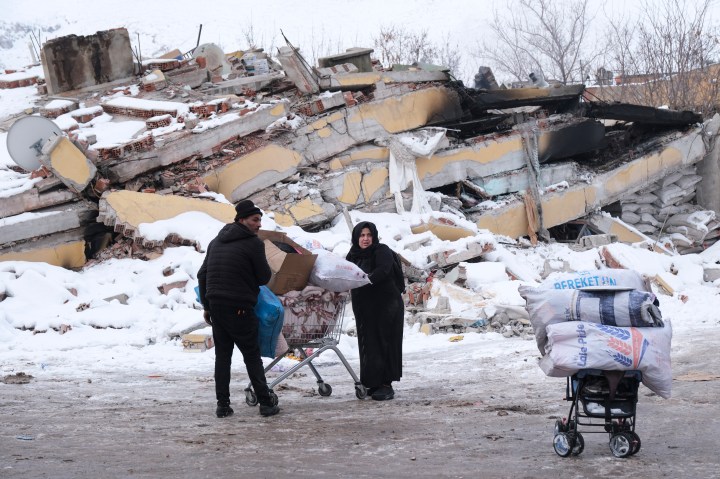
How aid is getting to earthquake-affected Turkey and Syria
How aid is getting to earthquake-affected Turkey and Syria

The 7.8 magnitude earthquake that hit Turkey and Syria earlier this week has killed an estimated 11,000 people as of Feb. 8 across both countries, and many thousands have been left homeless.
A disaster like this calls for much-needed aid and support from around the world. To get a better sense of how aid is flowing to those affected, Marketplace’s David Brancaccio spoke with Dr. Julie Varughese, senior vice president of programs and chief medical officer at Americares, a disaster relief nonprofit.
Below is an edited transcript of their conversation.
David Brancaccio: Your organization Americares doesn’t just send aid hoping it might be useful. What information are you now getting on what’s needed most immediately in the earthquake zone?
Julie Varughese: We are very fortunate that we’ve been working in the region for over a decade and have long-standing partnerships with several organizations on the ground. So our information is coming directly from partners in terms of what they’re seeing, what they’re identifying as needs and specific medications and medical supplies that they’re identifying as most critical.
Brancaccio: I mean, I’m imagining antibiotics, bandages, what kind of stuff?
Varughese: Yeah, so certainly trauma-related supplies, given the number of crush injuries and other sorts of surgical needs, infectious disease products, hygiene kits, antibiotics. We’re also hearing needs around chronic disease medication, certainly that will be an ongoing need in the weeks and months ahead as well.
Brancaccio: Chronic disease medications like if a person has diabetes, for example, and may no longer have access to their medicine.
Varughese: Exactly. People fled their homes quickly. There’s extensive damage and collapsed buildings. People may not have their stock of medications. And so they will potentially experience exacerbations and need those chronic disease medications quickly.
Brancaccio: And for people just getting acquainted with your organization, Americares. Where do you get the stuff that you send into the zone?
Varughese: That’s a great question. We are fortunate to partner with over 200 pharmaceutical companies that provide us with those critically needed products, particularly in times of disaster. We conduct outreach specifically to those partners in terms of critically needed medicines and medical supplies.
Brancaccio: I mean that’s the trick in this kind of emergency market that you’ve set up, right. In other words, you figure out what is necessary. You find out what you could get, and serve really as a conduit between the producers of medical aid and the people who need it.
Varughese: Yeah, absolutely. We do feel that it’s an important role that we are playing between the pharmaceutical partners and then being able to get aid into the countries. I would also add that we are going to be deploying a team to also be on the ground working with our local partners and really understanding firsthand what those additional needs are, both for medicines, medical supplies and other broader health needs.
There’s a lot happening in the world. Through it all, Marketplace is here for you.
You rely on Marketplace to break down the world’s events and tell you how it affects you in a fact-based, approachable way. We rely on your financial support to keep making that possible.
Your donation today powers the independent journalism that you rely on. For just $5/month, you can help sustain Marketplace so we can keep reporting on the things that matter to you.











